A new study shows some of the most terrifying effects of climate change are already here

We often think of the worst effects of climate change as things that will have to be dealt with in the future. But the fact of the matter is climate change is happening now, and it's already having an adverse effect on the health of millions around the world. In the fifth annual edition of the Lancet Countdown on Health and Climate Change published Wednesday, scientists warned that rising global temperatures, along with the ongoing emissions of dangerous pollutants, is already causing severe and sometimes deadly consequences, particularly for older populations.
The report is a stark and devastating reminder that while our goal should be to keep the planet from warming to 1.5 degrees Celsius above pre-industrial levels, the planet's surface temperature is already rising, and it is starting to take its toll on humans. The report tracked 475 million heatwave events globally in 2019 alone, which disproportionately affect vulnerable populations who do not have the necessary shelter or technology to counteract the sweltering heat. Those heatwaves are leading to more deaths than ever before. A total of 296,000 people over the age of 65 passed away due to extreme heat in 2018. That's a nearly 54 percent increase in the number of fatalities linked to heat since the start of the century.
Those unnecessary deaths, along with nearly one million deaths tied to air pollution and many others stemming from the mortality risks exacerbated by climate change, are not the only way the rising temperature of the planet has affected people. As heatwaves become increasingly common, many people have had their ways of life interrupted. Workers across the world saw their labor capacity shrunk by the heat, with 302 billion hours lost to untenable conditions last year, up from 199 billion in 2000. As workers lost hours and earnings, the effect was felt on the economies of countries as well. India and Indonesia lost the labor capacity equivalent of between 4 and 6 percent of their annual gross domestic product, according to the report.
In the United States, these adverse outcomes were particularly present. The country's growing elderly population was exposed to 102 million more person-days of heatwave events in 2019 than they were faced with just two decades earlier. A person-day is the equivalent of one person experiencing one day of exposure, so one person living in an area experiencing a week-long heatwave would count as seven person-days total.
Things have gotten significantly worse in the last 10 years, as eight of the 10 highest-ranking years of heatwave exposure for older Americans have occurred since 2010. This is particularly troubling, as this population is among the most vulnerable to heat. Studies have found that elderly people have a harder time regulating their body temperature and dissipating heat, which can result in negative health outcomes when exposed to hot temperatures. The Lancet report shows just how devastating those outcomes can be, as it found that heat-related mortalities have nearly doubled for older Americans since 2000, with nearly 20,000 people dying from heat exposure in 2018.
The increased heat doesn't just affect people, but the planet, too. That's particularly apparent in the US, where higher temperatures and drier weather have led to increased risks of wildfire events. Americans have experienced a total of 1.85 billion person-days of exposure to high wildfire risk from 2016 to 2019, marking a nearly 20 percent increase in exposure from the start of the century. Wildfires, like the ones that ravaged the West Coast this summer, destroy everything in their paths and carry dangerous long-term health effects, as they generate lots of air pollution. The increased number of wildfires play a significant role in the steady decline in air quality the US has experienced since 2016.
Even with the knowledge that climate change is adversely affecting our health, and with much of the world in agreement that climate change is an increasingly pressing issue, the Lancet report found that the majority of the world is not prepared for what climate change might bring us. Only half of the 101 countries surveyed had national health and climate plans that account for the changing climate. Just four of those countries reported adequate funding for these plans. This lack of preparation comes in spite of the fact that nearly two-thirds of 814 major cities globally report that they expect climate change will significantly compromise their existing public health infrastructure.
Climate change is already affecting the planet as well as our daily lives and wellbeing, yet we still aren't taking it seriously enough and we still don't have the tools to address it. If the latest edition of the Lancet Countdown is the planet's annual physical, it says we're in rough shape.